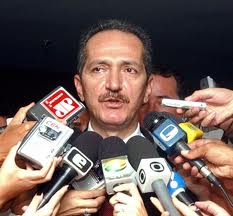Here’s something to ponder in a week when Brazil are expected at Wembley for a friendly international: for more than half a century, the canary-shirted Brazil playmaker has been the embodiment of all that is best about the game that conquered the world; yet, as the sport has grown rich, the home of o jogo bonito has been reduced to a dusty outpost of the shiny multinational that is Planet Football.
This is what Aldo Rebelo (pictured), Brazilian sports minister, had to say on the subject only last month.
“Even though Brazil is a country that has won the World Cup the most times [five] and it is a country where football is the biggest passion, football is only 2% of the global GDP of football per se, while English football accounts for 30% or more of that GDP and Spanish football is around 20% or more of that GDP.
“This,” Rebelo went on, “is a deformity”.

I wouldn’t bet my house on the absolute precision of those figures, but the order of magnitude is probably about right.
And, in case you are sceptical, here are some more statistics to back the point up.
In the recently published edition of the Deloitte Football Money League, the highest-ranked Brazilian club was Corinthians – in 31st place.
To me, still more tellingly, when FIFA divvied up over $38 million of payments to clubs which employed the players who featured in the 2010 World Cup, only $298,800 – not even 1% – went to clubs under the auspices of the Confederação Brasileira de Futebol (CBF).
That made Brazil the 25th-biggest recipient, just ahead of Paraguay and Israel, but well below New Zealand in 19th place and Scotland in 21st.
Rebelo, of course, is part of the government of a country that is hosting both the next World Cup and the next Summer Olympic Games.
Not surprisingly, he wants to exploit this favoured position to address the deformity.
“This is a problem we need to solve,” he says.
“We need to correct this by professionalising football activity, by democratising the structure of football and this is something we want to use the World Cup to boost.
“We want to use the World Cup for a starting-point for this professionalising and democratising structure of football.”
The trouble is, if it ends up adding further lustre to the idealised figure of the canary-shirted Brazil playmaker, the 2014 World Cup may simply entrench the underlying issues that have brought us here in the first place.
These are:
1. Brazilian clubs lack the financial firepower of their European counterparts.
2. European clubs love the idea of having a Brazilian or two on the roster to enhance prestige and perk up interest.
3. It makes little difference for those planning the itinerary of the Brazil national team – the biggest draw in international football – whether the men in canary yellow shirts play for clubs at home or abroad. Indeed, it is probably helpful in some ways if they are based overseas.
The result has been an export boom in Brazilian players.
The sheer extent of this was first brought home to me by a reading of Alex Bellos’s fascinating book, Futebol – the Brazilian way of life, which opens (disconcertingly) with a visit to the village of Toftir in the Faroe Islands, a settlement with 1,000 people, a fish factory and “a football club with three Brazilians”.
The most obvious way for many to make money out of Brazilian football in recent years has been to keep the export drive going.
With a World Cup to host, we can be pretty sure that Brazil’s share of football’s global GDP will rise this year and next.
The new stadia may help over a longer period by enabling Brazilian clubs to boost their matchday/commercial revenues, as has happened in Germany, host of the 2006 World Cup.
But anyone serious about significantly increasing Brazil’s sliver of the world football pie on a durable basis will probably need to slow and, to an extent, reverse that flow of players.

There have been some recent indications of a slight redressing of the imbalance: Neymar (pictured) remains in Brazil at the ripe old age of 21; Ronaldinho has returned there to finish his career.
To stand a chance of turning the tide, though, I think you would need either somehow to ban Brazilians below a certain age from playing for foreign clubs, or, preferably, to find a way of making Brazilian clubs noticeably richer.
The most obvious way of achieving this would be to follow the trail blazed by the Europeans: that is to say, create club competitions so compelling that fans – at home and, critically, internationally – are prepared to stump up a premium monthly TV subscription to watch the drama unfold.
That may not be quite as tall an order as you might think: Brazil is football mad; it is a populous nation whose standard of living has been rising steadily in recent years; the calibre of top Brazilian sides, moreover, remains high in spite of the exodus – the aforementioned Corinthians are reigning champions both of the Copa Libertadores, the top South American club competition, and the FIFA Club World Cup.
You need more than a high standard of play, though, to stimulate the sort of levels of international interest likely to enable Brazilian clubs to compete financially with the likes of Benfica and Borussia Dortmund, let alone the Barcelonas and Manchester Uniteds at the very summit of the club game.
I wonder if it might not be worth attempting to enlist the help of the prime beneficiaries of football’s money machine, the Europeans, to help Brazil (and other South American nations) to fight back.
Perhaps I was at an impressionable age, but I always loved the idea of the Intercontinental Cup that used to pit the European and South American champions against each other, over two legs, for an unofficial championship of the world.
Yes, when at their most intense, these clashes were memorable more for their extraordinary levels of violence than any football they produced.
But I think that would be less of a problem today; and the home and away format ensured the matches took place in a passionate atmosphere, rather than the insipid conditions that can pertain when a neutral venue is used.
To make much of a financial impact, any revival of this competition would need to be expanded – perhaps to 16 teams, consisting of the Copa Libertadores and Champions League quarter-finalists.
This raises the question of where it would fit into football’s already overcrowded calendar.
How about in odd years, when there is no World Cup or European Championship, during the European summer close season?
FIFA might not like it, if it was felt that it devalued the Club World Cup.
But I think that competition would die largely unlamented and, while I can sympathise with the world governing body’s attempts to find another reliable revenue-generator to go with the World Cup itself, which of course comes only once every four years, I think the women’s World Cup will prove a much more promising avenue.
I know I would pay to watch an Intercontinental Cup revival mapped out along those lines and, if it increased European interest in South American teams, it could have the valuable knock-on benefit of lifting the value of international broadcasting rights for the Copa Libertadores.
Who knows? South American clubs might eventually be able to afford to bring in some non-South American players who have made their names in Europe, giving European fans another reason to take an interest.
And, yes, ideally an Intercontinental Cup would be open to clubs from more than one and a half continents.
I have no doubt that tournament structures more compelling than the Club World Cup could be devised with the aim of ensuring that clubs from outside the regions that have traditionally dominated the world game become competitive enough to make such a proposition riveting international viewing.
But that is well outside the purview of a column devoted principally to Brazil and how the country of Pelé, Rivelino, Socrates and so many others might earn more from its football obsession.
David Owen worked for 20 years for the Financial Times in the United States, Canada, France and the UK. He ended his FT career as sports editor after the 2006 World Cup and is now freelancing, including covering the 2008 Beijing Olympics, the 2010 World Cup and London 2012. Owen’s Twitter feed can be accessed at www.twitter.com/dodo938

